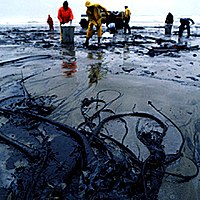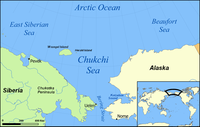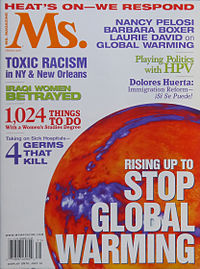
Potential impacts of offshore oil spills on polar bears in the Chukchi Sea.
Sign Up to like & getrecommendations! Published in 2018 at "Environmental pollution"
DOI: 10.1016/j.envpol.2017.12.057
Abstract: Sea ice decline is anticipated to increase human access to the Arctic Ocean allowing for offshore oil and gas development in once inaccessible areas. Given the potential negative consequences of an oil spill on marine… read more here.
Keywords: spill; sea; oil spills; polar bears ... See more keywords

Analysis of hair steroid hormones in polar bears (Ursus maritimus) via liquid chromatography-tandem mass spectrometry: comparison with two immunoassays and application for longitudinal monitoring in zoos.
Sign Up to like & getrecommendations! Published in 2021 at "General and comparative endocrinology"
DOI: 10.1016/j.ygcen.2021.113837
Abstract: Analysis of hair cortisol concentrations (HCCs) is a promising method for monitoring long-term stress in mammals. However, previous measurements of HCCs in polar bears (Ursus maritimus) have yielded highly variable results, which are likely due… read more here.
Keywords: bears ursus; hair; analysis hair; hair steroid ... See more keywords

Adipose tissue transcriptome is related to pollutant exposure in polar bear mother-cub pairs from Svalbard, Norway.
Sign Up to like & getrecommendations! Published in 2020 at "Environmental science & technology"
DOI: 10.1021/acs.est.0c01920
Abstract: Being at the food chain apex, polar bears (Ursus maritimus) are highly contaminated with persistent organic pollutants (POPs). Females transfer POPs to their offspring through gestation and lactation, therefore, young cubs present higher POPs concentrations… read more here.
Keywords: svalbard norway; exposure; polar bears; mothers cubs ... See more keywords

Ecological Change Drives a Decline in Mercury Concentrations in Southern Beaufort Sea Polar Bears.
Sign Up to like & getrecommendations! Published in 2017 at "Environmental science & technology"
DOI: 10.1021/acs.est.7b00812
Abstract: We evaluated total mercury (THg) concentrations and trends in polar bears from the southern Beaufort Sea subpopulation from 2004 to 2011. Hair THg concentrations ranged widely among individuals from 0.6 to 13.3 μg g-1 dry… read more here.
Keywords: southern beaufort; polar bears; thg concentrations; beaufort sea ... See more keywords

Polar Bears to Vanish from Most of the Arctic This Century
Sign Up to like & getrecommendations! Published in 2020 at "Eos"
DOI: 10.1029/2020eo150977
Abstract: A “timelines of risk” model shows when and where population collapse begins as sea ice wanes in our warming future. read more here.
Keywords: arctic century; bears vanish; polar bears; vanish arctic ... See more keywords

Preppers, bunkers and emaciated polar bears
Sign Up to like & getrecommendations! Published in 2020 at "Nature"
DOI: 10.1038/d41586-020-01127-9
Abstract: How to live in the face of death — Mark O’Connell’s personal journey. By Caspar Henderson. How to live in the face of death — Mark O’Connell’s personal journey. By Caspar Henderson. read more here.
Keywords: preppers bunkers; bunkers emaciated; polar bears; emaciated polar ... See more keywords

Environmental and behavioral changes may influence the exposure of an Arctic apex predator to pathogens and contaminants
Sign Up to like & getrecommendations! Published in 2017 at "Scientific Reports"
DOI: 10.1038/s41598-017-13496-9
Abstract: Recent decline of sea ice habitat has coincided with increased use of land by polar bears (Ursus maritimus) from the southern Beaufort Sea (SB), which may alter the risks of exposure to pathogens and contaminants.… read more here.
Keywords: exposure; exposure pathogens; polar bears; behavioral changes ... See more keywords

Plasmon-Activated Water can Prolong Existing Sea-Ice Habitats to Potentially Save Polar Bears
Sign Up to like & getrecommendations! Published in 2019 at "Scientific Reports"
DOI: 10.1038/s41598-019-46867-5
Abstract: Due to increasing global warming resulting from the greenhouse effect, subsequent environmental impacts and corresponding ecological influences are unavoidable. These problems are becoming more serious with time. Due to rising temperatures, the survival crisis of… read more here.
Keywords: save polar; water; sea; polar bears ... See more keywords

Distinct gut microbiomes in two polar bear subpopulations inhabiting different sea ice ecoregions
Sign Up to like & getrecommendations! Published in 2022 at "Scientific Reports"
DOI: 10.1038/s41598-021-04340-2
Abstract: Gut microbiomes were analyzed by 16S rRNA gene metabarcoding for polar bears ( Ursus maritimus ) from the southern Beaufort Sea (SB), where sea ice loss has led to increased use of land-based food resources… read more here.
Keywords: polar bears; sea; sea ice; gut microbiome ... See more keywords

Bearing Witness? Polar Bears as Icons for Climate Change Communication in National Geographic
Sign Up to like & getrecommendations! Published in 2019 at "Environmental Communication"
DOI: 10.1080/17524032.2018.1435557
Abstract: ABSTRACT This article investigates how polar bears were established as icons of climate change in the popular science magazine National Geographic. In a multistep process, anthropomorphized depictions first established polar bears as subjects of identification.… read more here.
Keywords: communication; change; icons climate; national geographic ... See more keywords

Corrigendum: Internet Blogs, Polar Bears, and Climate-Change Denial by Proxy.
Sign Up to like & getrecommendations! Published in 2018 at "Bioscience"
DOI: 10.1093/biosci/biy033
Abstract: [This corrects the article DOI: 10.1093/biosci/bix133.]. read more here.
Keywords: internet blogs; bears climate; corrigendum internet; blogs polar ... See more keywords